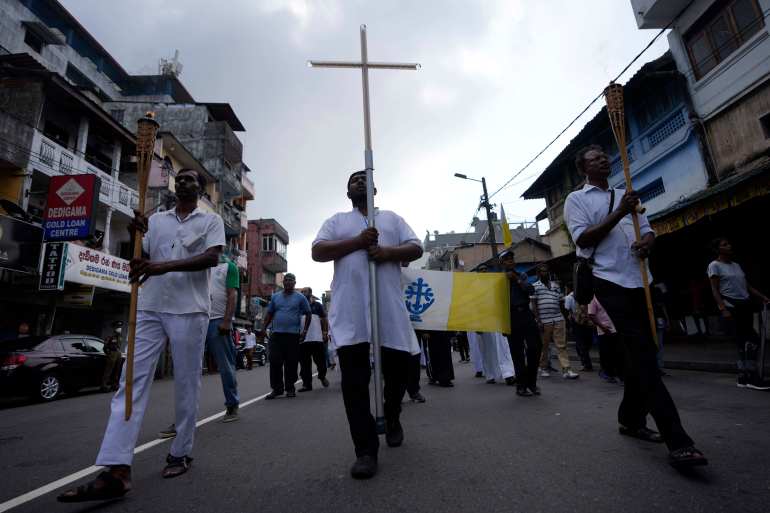Sri Lanka to probe allegation of intelligence complicity in 2019 bombings
British TV report alleges a top Sri Lankan intelligence official hatched the deadly Easter Sunday bombings plot to help Rajapaksa win the election.

Sri Lanka’s government will appoint a parliamentary committee to investigate allegations made in a British television report that Sri Lankan intelligence had complicity in the 2019 Easter Sunday bombings that killed 269 people.
Labour Minister Manusha Nanayakkara told the parliament on Tuesday that details on the investigation will be announced soon.
Keep reading
list of 4 itemsSri Lanka ex-leader ordered to compensate Easter bombing victims
Pope asks Sri Lanka to reveal identity of Easter Sunday attackers
Sri Lankan protesters demand justice for 2019 Easter bombings
A man interviewed in the Channel 4 videos released on Tuesday said he arranged a meeting between a local ISIL (ISIS)-inspired group and a top state intelligence official to hatch a plot to create insecurity in Sri Lanka and enable Gotabaya Rajapaksa to win the presidential election later that year.
Azad Maulana was a spokesman for a breakaway group of the Tamil Tiger rebels that later became a pro-state armed group and helped the government defeat the rebels and win Sri Lanka’s decades-long civil war in 2009.
Rajapaksa was a top defence official during the war, and his older brother, Mahinda Rajapaksa, had been defeated in the 2015 elections after 10 years in power.

A group of Sri Lankans inspired by the ISIL group carried out the six near-simultaneous suicide bombings in churches and tourist hotels on April 21, 2019.
The attacks killed 269 people, including worshippers at Easter Sunday services, locals and foreign tourists, and revived memories of frequent bombings during the quarter-century war.
Fears about national security enabled Rajapaksa to sweep to power. He was forced to resign last year after mass protests over the country’s worst economic crisis.
In the Channel 4 programme, Maulana said he arranged a meeting in 2018 between ISIL-inspired fighters and a top intelligence officer at the behest of his boss at the time, Sivanesathurai Chandrakanthan, the leader of the rebel splinter group-turned-political party.
Maulana said Chandrakanthan had met the group in prison while in detention on allegations of murder and found they could be useful in creating insecurity in the country.
Maulana told Channel 4 that he did not participate in the meeting but that the intelligence officer told him later that creating insecurity was the only way to return the Rajapaksa family to power.
After security camera footage of the bombings was released, Maulana recognised the faces of the attackers carrying bomb-laden backpacks as those whom he had arranged to meet with the intelligence officer, Maulana said in the programme.
Channel 4 reported that Maulana had been interviewed by United Nations investigators and European intelligence services over his claims.
Neither Chandrakanthan nor Rajapaksa has commented on the claims.
Pro-Rajapaksa legislator Mahindananda Aluthgamage rejected the claims in the documentary. He told parliament Rajapaksa had no reason to set off bombs or use suicide bombers to get elected because public support was already on his side as shown by the result of local elections held in 2018.